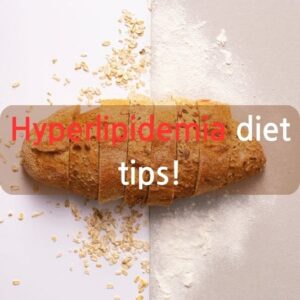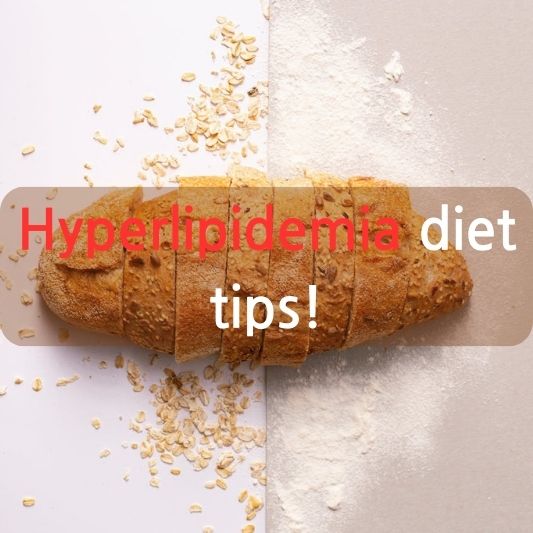Let’s talk about the hyperlipidemia diet.Hyperlipidemia is a disease that increases blood cholesterol or triglyceride levels. Hyperlipidemia builds up cholesterol and triglycerides in blood vessels, increasing the risk of arteriosclerosis, heart disease, and stroke.
Treatment of hyperlipidemia includes medication and diet. Medication is effective in quickly lowering blood cholesterol or triglyceride levels, but long-term use can cause side effects. Therefore, a combination of medication and diet can effectively manage hyperlipidemia.

Setting Hyperlipidemia Diet Goals
The goal of the hyperlipidemia diet is.
- Lower total cholesterol levels to less than 200mg/dL
- Lower LDL-cholesterol levels to less than 100mg/dL
- Lower triglyceride levels to less than 150mg/dL
- Increase HDL-cholesterol levels above 40mg/dL
Basic Principles of Hyperlipidemia Diet
The basic principles of hyperlipidemia diet are as follows.
- Restrictions on saturated fat and trans fat intake: Saturated fat and trans fat can raise LDL-cholesterol levels in the blood. Therefore, it is recommended to avoid foods high in saturated and trans fats such as meat, butter, cheese, margarine, and fries as much as possible.
- Expanding unsaturated fat intake: Unsaturated fat can lower LDL-cholesterol levels in the blood and increase HDL-cholesterol levels. Therefore, it is recommended to eat foods high in unsaturated fats such as olive oil, perilla oil, avocados, and nuts.
- Carb intake restrictions: Carbohydrates can raise blood triglyceride levels. Therefore, it is recommended to eat as little carbohydrate food as possible, such as rice, bread, and noodles.
- Expansion of fiber intake: Fiber helps to curb the absorption of cholesterol and triglycerides. Therefore, it is recommended to eat enough fiber-rich foods such as vegetables, fruits, and seaweed.
- Weight loss: Heavy weight increases your risk of hyperlipidemia. Therefore, it is recommended to lose weight through proper exercise and diet control to maintain a healthy weight.
Foods that are helpful for the hyperlipidemia diet
The following foods are helpful for the hyperlipidemia diet.
- Vegetables: Vegetables are low in calories and high in fiber, which helps to lower blood cholesterol and triglyceride levels.
- Fruits: Fruits are healthful because they are rich in vitamins, minerals, and fiber. In particular, berries help lower cholesterol levels.
- Nuts: Nuts are rich in unsaturated fats, which helps to lower blood cholesterol levels.
- Fish: Fish is rich in omega-3 fatty acids, which help lower blood triglyceride levels.
- Beans: Beans are rich in protein and fiber, which helps to lower cholesterol levels.
Tips for practicing hyperlipidemia diet
- The hyperlipidemia diet is an effective way to lower blood cholesterol and triglyceride levels. However, when practicing diet, you should take the following precautions.
- Don’t change fast. If you change your diet rapidly, your body can be stressed and your cholesterol level can increase. Therefore, it is important to improve your diet steadily.
- Maintain a balanced diet. The hyperlipidemia diet focuses on lowering blood cholesterol and triglyceride levels, but it is also important to maintain a balanced diet that contains nutrients evenly.
- Do regular exercise at the same time. Exercise lowers blood cholesterol levels and helps you lose weight. Therefore, it is recommended that you exercise regularly at the same time.
- I take care of it constantly. Hyperlipidemia is a disease that requires lifelong care. Therefore, it is important to constantly manage your diet and exercise to maintain blood cholesterol and triglyceride levels in the normal range.
Specific precautions
- Restrict the intake of saturated and trans fats. Saturated fats and trans fats can raise LDL-cholesterol levels in the blood. Therefore, it is recommended to avoid foods high in saturated and trans fats such as meat, butter, cheese, margarine, and fries as much as possible.
- Expand unsaturated fat intake. Unsaturated fats can lower LDL-cholesterol levels in the blood and increase HDL-cholesterol levels. Therefore, it is recommended to eat foods high in unsaturated fats such as olive oil, perilla oil, avocados, and nuts.
- Restrict your carbohydrate intake of carbohydrates. Carbohydrates can raise blood triglyceride levels. Therefore, it is recommended to eat as little carbohydrate food as possible, such as rice, bread, and noodles.
- Expand fiber intake. Fiber helps to suppress the absorption of cholesterol and triglycerides. Therefore, it is recommended to eat enough fiber-rich foods such as vegetables, fruits, and seaweed.
- I lose weight. Heavy weight increases the risk of hyperlipidemia. Therefore, it is recommended to lose weight through proper exercise and diet control to maintain a healthy weight.
hyperlipidemia diet tips
Here are some tips to help you practice the hyperlipidemia diet.
- Record your diet. Recording what food you eat and how much you eat helps you improve your eating habits.
- Check the nutritional information of the food. Checking the nutritional information of the food helps you identify the nutritional content of the food and construct a balanced diet.
- I eat various foods. Eating just one food can lead to nutritional imbalance. Therefore, it is good to eat various foods evenly.
- Set meal times regularly. Setting a regular meal time will help you control your blood sugar.
- I chew food slowly. Chewing food slowly helps you feel full.
Practicing a hyperlipidemia diet can lower blood cholesterol and triglyceride levels and reduce the risk of cardiovascular disease. Therefore, it is important to actively practice diet if you are diagnosed with hyperlipidemia.
conclusion
Hyperlipidemia is a disease that increases blood cholesterol and triglyceride levels and can increase the risk of cardiovascular disease. There are medications and diets to treat hyperlipidemia. Medication is effective in quickly lowering blood cholesterol and triglyceride levels, but long-term use can cause side effects. Therefore, a combination of medication and diet can effectively manage hyperlipidemia.
Frequently Asked Questions
How should I start a hyperlipidemia diet?
At first, it’s better to improve your diet little by little rather than change your diet rapidly. It is recommended to reduce foods high in saturated and trans fats, and increase foods rich in unsaturated and fiber.
What should I be careful about when practicing a hyperlipidemia diet?
It is important to avoid drastic changes and to improve your diet steadily. Also, it is recommended to maintain a balanced diet and exercise regularly.
How much can a hyperlipidemia diet reduce blood cholesterol and triglyceride levels?
The diet can reduce blood cholesterol and triglyceride levels by 10-20%. However, medication may be necessary if blood cholesterol and triglyceride levels are very high, or if the risk of cardiovascular disease is high.
Hyperlipidemia is a disease that requires lifelong care. Therefore, it is important to constantly manage your diet and exercise to maintain blood cholesterol and triglyceride levels in the normal range.
Find out how much nutritional supplements can help with hyperlipidemia on iHub!
